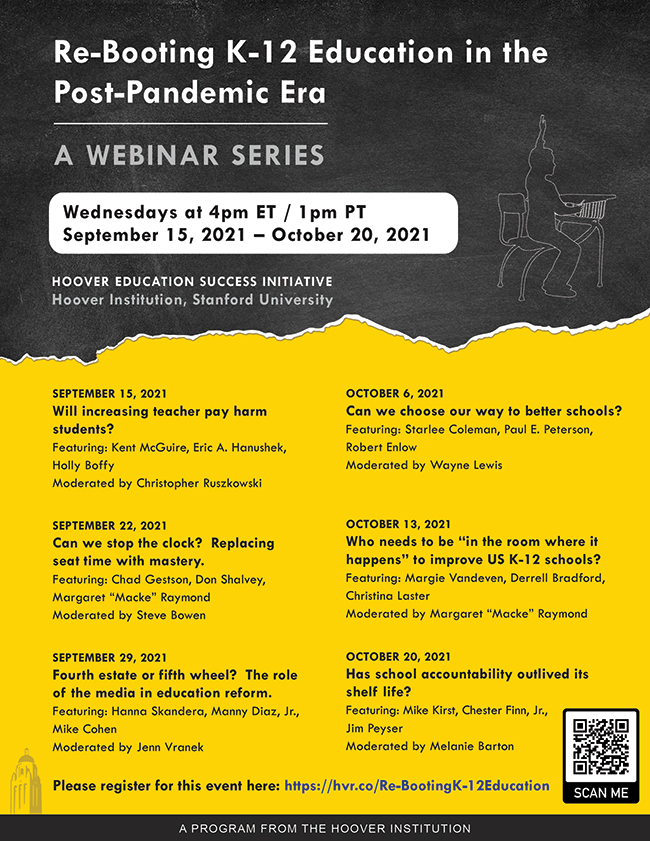The Hoover Education Success Initiative (HESI) hosted the final episode in a six-part series that explores how public education can improve amidst the disruption of in-person instruction caused by COVID-19-inspired restrictions.
The session, “Has School Accountability Outlived Its Shelf Life?” featured Michael Kirst, emeritus professor of education and business administration at Stanford University and former president of California’s state board of education; Chester E. Finn, Jr., Hoover Institution senior fellow; and James Peyser, secretary of education for the Commonwealth of Massachusetts. The program was moderated by Melanie Barton, senior education advisor to the governor of South Carolina.
A RECAP OF THE DISCUSSION
Peyser started the conversation by arguing that accountability programs and standard-based reform cannot alone improve poorly performing schools. He said that the Every Student Succeeds Act (ESSA), the national law that governs education policy, should not be overhauled and that schools should resume the national assessments that have been on pause since March 2020, when schools across the country shut down due to public health restrictions in the wake of the COVID-19 pandemic. However, he maintained that within the ESSA framework, the burden should be placed on state governments to improve accountability programs. He stressed the need to close glaring national achievement gaps, including providing support for a large proportion of students who have failed to reach a sufficient reading level by the third grade.
Referencing his recent HESI essay, “Results-Based Accountability for Schools: Education’s Heaviest Lift,” Finn also emphasized that the country should resume national assessments. He explained that currently, testing data is vitally important not only because it gauges proficiency but also because it indicates how schools need to prepare students for their next level of education. He said that accountability programs should focus on aspects of students’ development that testing doesn’t measure, including character and social and emotional well-being. Furthermore, he asserted that policy makers should seek alternative accountability measures instead of just resorting to interventions and closures of badly performing schools. Recognition should be given to schools that are enabling their students to excel. Additionally, he maintained that a student should be able to obtain an exit visa, that is, the option of leaving a poorly performing school in favor of attending one of their choice.
In his remarks, Kirst argued that student assessments should be closely aligned to content being taught daily in the class room. This would allow educators to provide formative testing, without having to reteach subject matter for a year-end summative test. He also stressed that subject matter standards should be tied to preparation for courses at the postsecondary level.
Tags: school accountability, testing, summative test, formative test, National Assessment of Education Progress, NAEP, student achievement, achievement gaps, Every Student Succeeds Act, ESSA
LISTEN TO THE DISCUSSION
FEATURED PANELISTS
Michael Kirst, Stanford University, Panelist: Dr. Kirst is Professor Emeritus of Education and Business Administration (by courtesy) at Stanford. He is the longest-serving President of California’s State Board of Education, having served four terms from 1975 to 1982 and again from 2011 to 2019.
Checker Finn, Hoover Education Success Initiative (HESI), Panelist: Dr. Finn is a Senior Fellow at the Hoover Institution and member of HESI’s Steering Committee. He is President Emeritus of the Thomas B. Fordham Institute, and served as a member of the Maryland State Board of Education.
Secretary James Peyser, State of Massachusetts, Panelist: Secretary Peyser directs the Executive Office of Education in Massachusetts, which oversees early childhood education, K-12, and higher education. He is Governor Charlie Baker’s most senior education advisor. He chaired the MA Board of Education from 1999 to 2006.
MODERATED BY
Melanie Barton, Office of Governor McMaster, Moderator: Melanie Barton is senior educator advisor to the Governor of South Carolina. Previously, she served as Executive Director of the South Carolina Education Oversight Committee, an independent nonpartisan committee comprised of education, civic, and business leaders.
The Hoover Education Success Initiative (HESI) focuses on providing state leaders with sound research-based recommendations to improve education in America.










